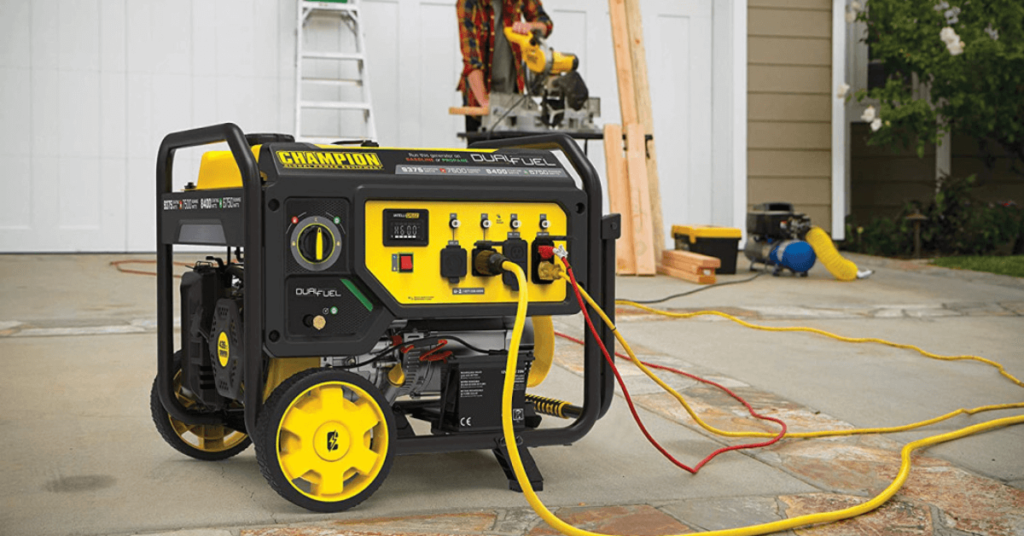Generators are an essential part of our lives, especially during emergencies or power outages. They provide us with electricity, ensuring that our homes and businesses remain functional.
However, with the rise in demand for generators, there has also been an increase in generator theft, posing a significant problem for generator owners.

Generator theft is a growing concern for homeowners, businesses, and even government agencies that rely on generators for backup power. According to the National Equipment Register, generator thefts have increased by over 50% in recent years, with the majority of thefts occurring from construction sites, businesses, and homes.
Importance Of Having An Electric Generator
Electric generators are essential for a variety of reasons, both for personal and commercial use. Here are some reasons why having an electric generator can be crucial:
Backup Power: One of the main reasons people invest in generators is to have a backup source of power during an outage. In case of power cuts, electric generators can provide temporary power to homes, businesses, and essential services such as hospitals and emergency services.
Business Continuity: In a commercial setting, having a generator can be crucial for business continuity. In case of power outages, it ensures that businesses can continue to function, and production can continue without interruption.
Remote Locations: For those living in remote locations or those who enjoy camping or outdoor activities, electric generators can provide power where there is no access to the electrical grid.
Construction Sites: Construction sites require a constant supply of power for various activities such as drilling, cutting, and welding. Electric generators are often used to provide power to these sites.
Emergency Services: Electric generators are also essential for emergency services such as fire departments, police stations, and hospitals, where a constant supply of power is required for lifesaving equipment and services.
Overall, electric generators play a crucial role in ensuring access to electricity, particularly during emergencies or power outages. Having a generator can provide peace of mind and ensure that important equipment, services, and activities can continue uninterrupted.
Why Are Electric Generators Stolen?
Electric generators are often targets of theft due to their portability and high resale value. Here are some reasons why electric generators are stolen:
Valuable Components: Generators contain valuable components such as copper wiring, which can be sold for scrap or reused in other equipment. Thieves often target generators to obtain these valuable components.
High Resale Value: Generators can be resold for a high price, making them attractive targets for thieves. The resale value depends on the size and condition of the generator, with larger industrial generators being more valuable.
Easy to Transport: Electric generators are often designed to be portable, making them easy to transport. Thieves can quickly load a generator onto a truck or trailer and drive away with it.
Lack of Security Measures: Many generator owners do not take proper security measures to protect their generators. This lack of security makes it easier for thieves to steal the generator without being detected.
Construction Sites: Construction sites are a common target for generator theft due to the presence of expensive equipment and tools. Thieves often target construction sites at night when they are unoccupied, making it easier to steal generators and other equipment.
Overall, the high resale value, portability, and lack of security measures make electric generators a popular target for theft. Generator owners must take appropriate security measures to protect their equipment and prevent theft.
How To Protect Your Generator From Theft At Home
Protecting your electric generator from theft at home is crucial to ensure that you have access to backup power when you need it. Here are some tips to protect your generator from theft:
Secure Storage: Store your generator in a secure location such as a locked shed or garage. If possible, choose a location that is not visible from the road or neighboring properties.
Use Chains and Locks: Use chains and locks to secure your generator to a stationary object such as a post or a tree. This makes it more difficult for thieves to steal the generator.
Install Motion-Activated Lights: Install motion-activated lights around your generator storage area. These lights will turn on when someone approaches the area, alerting you and deterring thieves.
Use Security Cameras: Install security cameras around your generator storage area. These cameras will record any activity around the area and can help identify thieves if a theft occurs.
Mark Your Generator: Mark your generator with a unique identifier such as your name, address, or phone number. This will make it easier to identify your generator if it is stolen and recovered.
Invest in an Alarm System: Invest in an alarm system for your generator. These systems will sound an alarm if someone tries to tamper with your generator, alerting you and scaring off thieves.
Consider Insurance: Consider purchasing insurance for your generator. This will provide you with financial protection in case your generator is stolen or damaged.
Overall, taking appropriate security measures can help protect your generator from theft at home. By securing your generator, you can ensure that you have access to backup power when you need it.
Generator Security: Protecting Your Investment
Electric generators provide a convenient and reliable source of power when grid power is unavailable, but they are also valuable targets for thieves. Whether you own a generator for residential or commercial use, it’s essential to take measures to protect it from theft and ensure its safe and environmentally responsible use. In this article, we’ll cover various strategies and technologies you can use to safeguard your generator, as well as tips for storage, insurance, and legal protection.
Preventing Generator Theft
Generator theft is a significant concern, especially for businesses and construction sites where generators are often left unattended overnight. Thieves may target generators because they are expensive to purchase, easy to transport, and can be resold quickly. However, there are several anti-theft measures you can take to reduce the likelihood of your generator being stolen.
Secure Your Generator With Locks And Chains.
One of the simplest and most effective ways to prevent generator theft is to secure it with locks and chains. You can use a heavy-duty chain and padlock to secure the generator to a fixed object, such as a tree or post. A high-quality chain and lock are difficult to cut or break, making it challenging for thieves to remove the generator. Be sure to use a lock that is weather-resistant, such as a brass or stainless-steel padlock.
Conceal Your Generator.
If your generator is visible from the road or sidewalk, it may attract the attention of potential thieves. Consider concealing your generator by placing it inside a shed, garage, or other secure location. If you must leave your generator outside, consider using a camouflage cover or painting it a non-descript color to make it less noticeable.
Mark Your Generator For Identification.
Marking your generator with your name or identifying information can help deter theft and make it easier to recover if it is stolen. You can use a permanent marker or engraving tool to mark your generator with your name or contact information. Additionally, you can register your generator with a national database, such as the National Equipment Register (NER), which can help law enforcement track and recover stolen equipment.
Install A Security System.
A security system can provide an extra layer of protection for your generator by alerting you and law enforcement if someone attempts to steal it. You can install a motion-activated security camera or alarm system near your generator to deter potential thieves. If you have a larger operation, consider investing in a GPS tracking system that can alert you if your generator is moved without authorization.
Electric Generator Safety
Generators can be a valuable source of power during a power outage or other emergency, but they can also pose safety risks if not used correctly. Here are some essential safety tips to keep in mind when using your generator:
Follow The Manufacturer’s Instructions.
Before using your generator, read the manufacturer’s instructions carefully and follow all safety guidelines. This includes information on how to set up, operate, and maintain your generator safely.
Use The Generator In A Well-Ventilated Area.
Generators produce carbon monoxide, a colorless and odorless gas that can be deadly if inhaled in high concentrations. Always use your generator in a well-ventilated area, at least 20 feet away from any open windows or doors.
Keep The Generator Dry.
Do not use your generator in wet or damp conditions, as this can increase the risk of electric shock or electrocution. If you must use your generator in wet conditions, use a cover or canopy to protect it from the rain.
Avoid Overloading Your Generator.
Do not overload your generator by connecting too many appliances or devices at once. This can damage your generator and increase the risk of fire or electric shock.
Anti-Theft Measures For Generators
In addition to the strategies outlined above for preventing generator theft, there are several other anti-theft measures you can consider:
Use A GPS Tracking Device.
A GPS tracking device can help you locate your generator if it is stolen. These devices can be installed discreetly on your generator and can provide real-time location information through a smartphone app or web-based interface.
Employ Security Personnel.
If you have a larger generator or are operating in a high-risk area, you may want to consider hiring security personnel to monitor your equipment. This can include hiring security guards or installing security cameras with a live feed to a security monitoring center.
Store Your Generator In a Secure Location.
Storing your generator in a secure location can help deter theft. Consider storing your generator in a locked shed or garage, or inside a fenced area with restricted access.
Invest In Generator Insurance.
Generator insurance can provide coverage for losses related to theft, damage, or other events. Make sure to read the policy carefully and understand the coverage limits and exclusions.
Recovering A Stolen Generator
If your generator is stolen, there are several steps you can take to increase your chances of recovering it:
File A Police Report.
As soon as you realize your generator has been stolen, file a police report. Provide as much information as possible, including the make, model, and serial number of the generator, as well as any identifying marks or features.
Check Online Marketplaces.
Thieves often try to resell stolen equipment online. Check online marketplaces, such as eBay or Craigslist, for any listings that match the description of your stolen generator.
Monitor Local Pawn Shops.
Thieves may try to pawn stolen generators for quick cash. Check local pawn shops and second-hand stores for any generators that match the description of your stolen equipment.
Use A Stolen Equipment Database.
Several national databases, such as the National Equipment Register, maintain records of stolen equipment. Check these databases regularly to see if your generator has been reported as stolen.
Workplace Generator Security
If you operate a generator at your workplace, it’s essential to take measures to ensure its security and safety. Here are some tips for workplace generator security:
Conduct Regular Safety Inspections.
Regular safety inspections can help identify potential hazards or safety risks associated with your generator. Inspect your generator regularly for damage, wear, and proper functioning.
Train Employees On Generator Safety.
Make sure your employees are trained on proper generator safety procedures, including how to operate and maintain the generator safely. Encourage employees to report any safety concerns or issues immediately.
Secure The Generator In A Locked Area.
Store your generator in a locked area with restricted access. Make sure employees are aware of the location of the generator and how to access it safely.
Use A Backup Power System.
Consider using a backup power system, such as a battery backup or an uninterrupted power supply (UPS), to provide power in the event of an outage. This can help reduce reliance on a generator and reduce the risk of theft or damage.
Generator Storage
Proper generator storage is essential to ensure its longevity and functionality. Here are some tips for generator storage:
Clean The Generator Before Storage.
Clean the generator thoroughly before storing it to remove any dirt, debris, or oil. This can help prevent rust or damage during storage.
Store The Generator In A Dry, Cool Place.
Store your generator in a dry, cool place, such as a garage or shed. Make sure the storage area is free from moisture and dust, which can damage the generator over time.
Use A Generator Cover.
Consider using a generator cover to protect the generator from dust, moisture, and other environmental factors. Make sure the cover is breathable to prevent moisture buildup.
Use A Fuel Stabilizer.
fuel stabilizer to the fuel tank before storing the generator. This can help prevent the fuel from deteriorating and causing damage to the generator.
Disconnect The Battery.
If your generator has a battery, disconnect it before storing the generator. This can help prevent the battery from losing charge or leaking acid.
Start The Generator Periodically.
Start the generator periodically, even if you’re not using it, to help keep it in good condition. Run the generator for a few minutes every three to six months to prevent rust and ensure that the engine and components are properly lubricated.
Generator Insurance
Generator insurance can provide coverage for losses related to theft, damage, or other events. Here are some things to consider when purchasing generator insurance:
Coverage Limits.
Make sure you understand the coverage limits of your policy. This will determine the maximum amount of coverage you can receive in the event of a loss.
Deductible.
Your insurance policy will likely have a deductible, which is the amount you’ll need to pay out of pocket before the insurance coverage kicks in. Make sure you understand the deductible amount and how it will impact your coverage.
Exclusions.
Insurance policies often have exclusions, which are specific circumstances or events that are not covered by the policy. Make sure you understand the exclusions of your policy and whether they apply to your situation.
Premiums.
Insurance premiums can vary widely depending on the coverage limits, deductible, and other factors. Shop around to find the best coverage and premiums for your needs.
Environmentally Responsible Generator Use
Using a generator can have a significant impact on the environment, particularly if the generator is powered by gasoline or diesel fuel. Here are some tips for environmentally responsible generator use:
Choose A Clean-Burning Fuel.
Consider using a generator that runs on propane or natural gas, which produces fewer emissions than gasoline or diesel fuel.
Use Energy-Efficient Appliances.
Choose energy-efficient appliances to reduce the amount of power your generator needs to produce. This can help reduce emissions and fuel consumption.
Turn Off The Generator When Not In use.
Turn off the generator when it’s not needed to reduce fuel consumption and emissions.
Follow Proper Maintenance Procedures.
Proper maintenance can help ensure that your generator is running efficiently and producing fewer emissions. Follow the manufacturer’s maintenance instructions and keep the generator clean and well-maintained.
Conclusion
Protecting your generator from theft, ensuring its safety and security, and using it in an environmentally responsible manner are all important considerations for generator owners. By following the tips outlined in this article, you can help prevent theft, protect your generator, and minimize its impact on the environment. Remember to always prioritize safety when operating and storing your generator, and consider investing in insurance to protect your investment.




